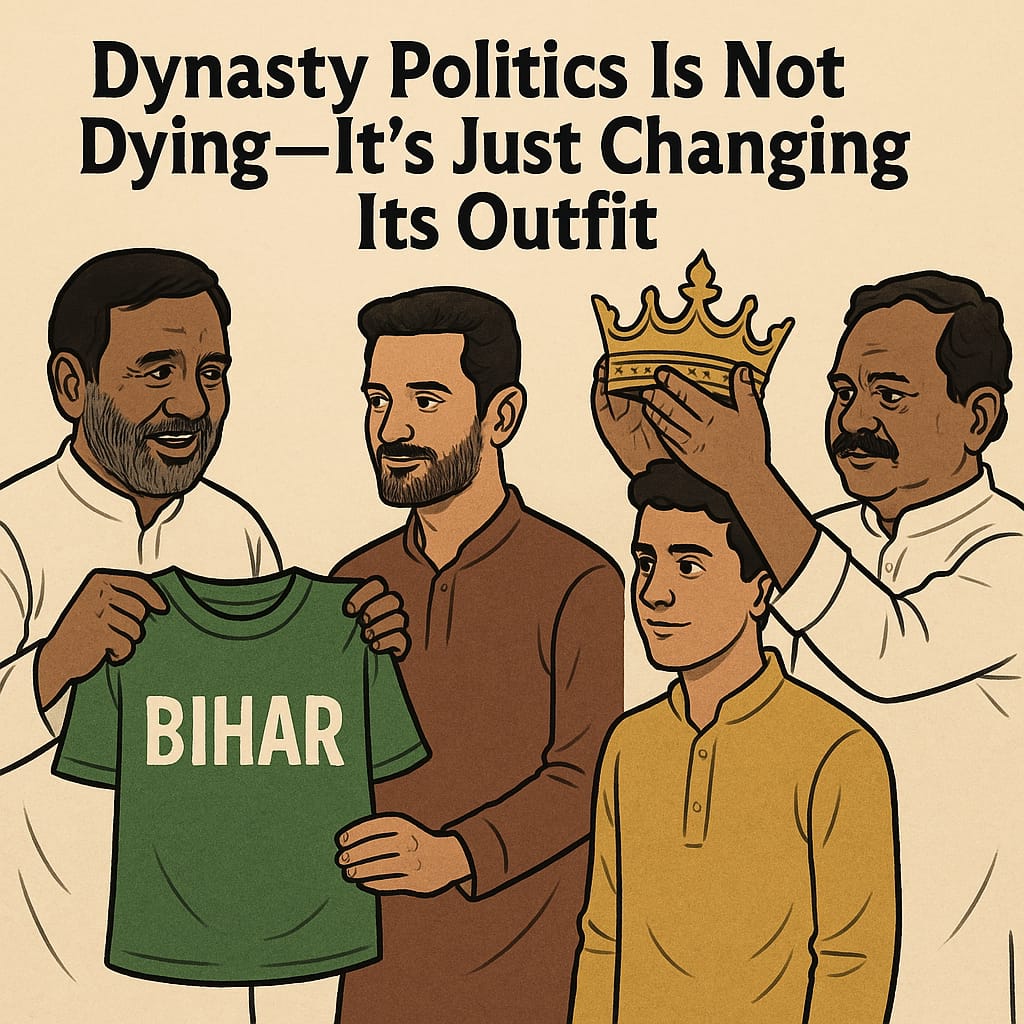
For years, mainstream parties like the BJP and JDU have built their rhetoric around dismantling dynastic politics, targeting rivals for promoting political heirs over grassroots leadership. Recent events in Bihar, however, suggest that the politics of inheritance are still very much in place, albeit with new packaging and distribution.
The recent usage of minor regional parties as dynastic shelters is the most obvious example. Take the Hindustani Awam Morcha (HAM), led by former CM Jitan Ram Manjhi. Despite projecting itself as a party of the marginalized, HAM has repeatedly fielded candidates from Manjhi’s own family. From his son Santosh Suman being made an MLC and minister, to the overwhelming control of ticket distribution and the nomination of his daughter-in-law, Deepa Manjhi, in a recent by-election, the Manjhi clan has turned HAM into more of a family enterprise than a political platform.
Then there’s the now- RLM, RLSP, once headed by Upendra Kushwaha. In a move that stunned political observers, the party gave a Lok Sabha ticket to Akash Singh, son of a sitting Congress Rajya Sabha MP, Akhilesh Singh, showing how the so-called regional parties were more than willing to serve as a backdoor for dynasts of other parties too.
The Vikassheel Insaan Party (VIP), led by Mukesh Sahni, went even further. In the 2020 assembly elections, it became a symbolic satellite of the BJP, giving tickets on its own party symbol to BJP leaders who couldn’t be accommodated in the NDA’s main seat-sharing formula. It was a clear case of ticket outsourcing, where ideology, loyalty, and merit were irrelevant, and only electoral math mattered.
Now, a new form of political irony is emerging: BJP-JDU, under the guise of fighting dynasticism, have seemingly co-opted a smaller party and are now placing their own sons and daughters into it. The ticket given to MP Shambhavi Chaudhary (daughter of Ashok Chaudhary) in the Lok Sabha election, despite her not being active in politics or a member of the LJP, and the possible candidature of Abhimanyu Yadav, son of former BJP MP Ramkripal Yadav, in the upcoming Vidhan Sabha election, signals a strategic move to bypass criticism by planting heirs in alternative political vehicles while maintaining an “anti-dynasty” narrative on the surface.
A Deeper Pattern: Political Franchising, Not Expansion
What emerges here is not just a contradiction, but a pattern of political franchising. Once national or major regional parties have reached their optimum level of seats, they begin to employ satellite parties or former regional parties. These parties are filled with loyalists or political heirs who had no other way of being placed within the party structure. Regional party politics in Bihar is, therefore, more about family lineage, capitulating to various interests, and controlling the fallout than ideology or caste-focused empowerment.
Most of these parties, be it HAM, RLSP, VIP, or others, have become “transfer stations” for dynasts, defectors, and denied candidates.
Ironically, while RJD and Congress have been criticised for open dynasticism, the new model is more covert, but equally entrenched.
Conclusion: The Voter Sees It All
The crucial aspect is not how politicians articulate their agendas, but how voters respond to them. With Bihar moving towards another election, it is yet to be confirmed whether the electorate will be swayed by the superficial anti-dynasty branding, or understand the sobering truth: in Bihar, dynasty isn’t dying. It is simply disguised in a new kurta.

Ravi Kumar is a political consultant and Socio-Political Writer. He comments on different contemporary political issues and writes about it as he has sound experience due to his prolonged work on the ground as persistent observer of the Democracy on field.
